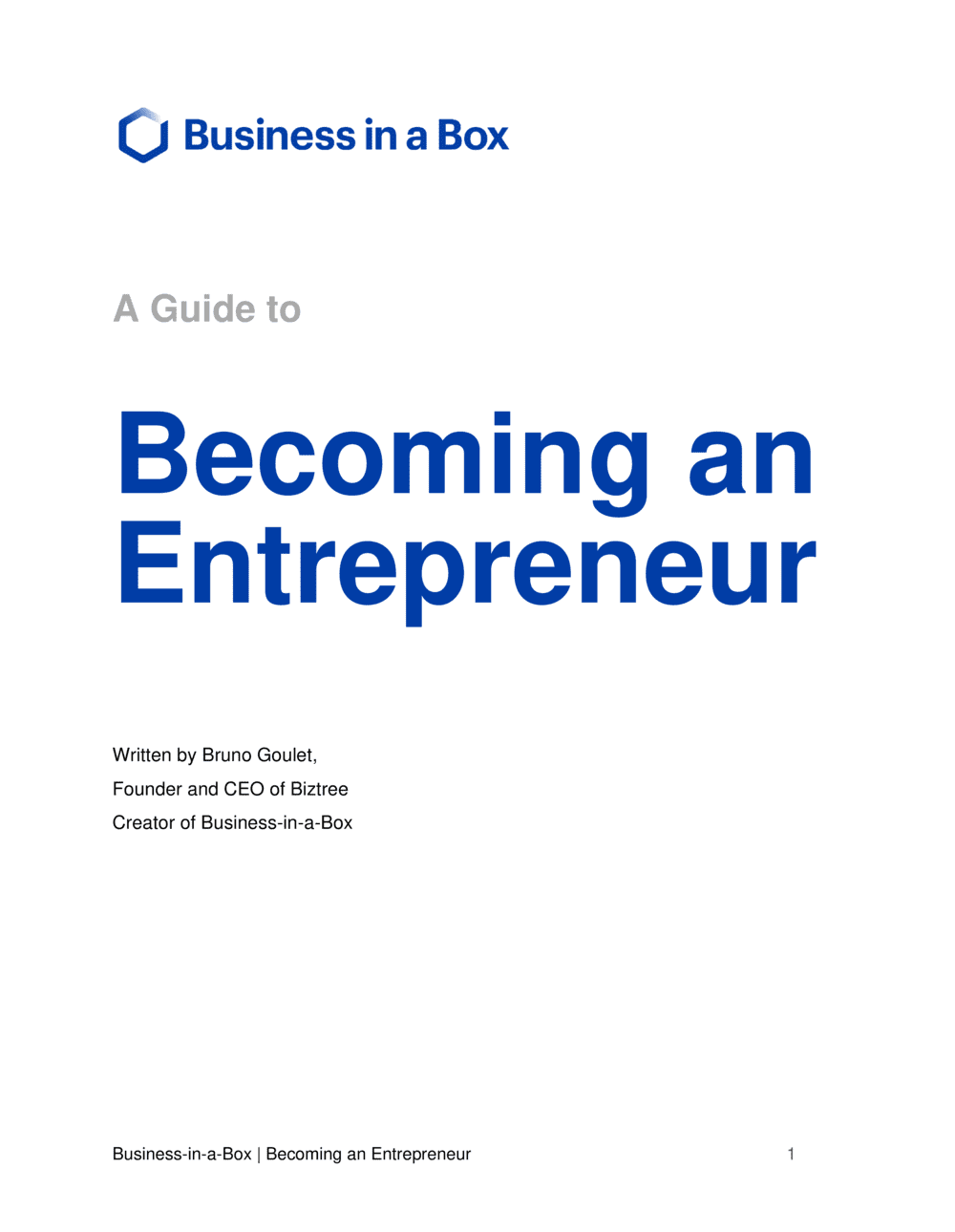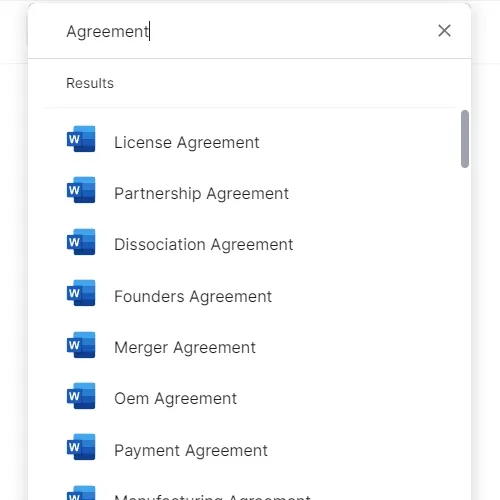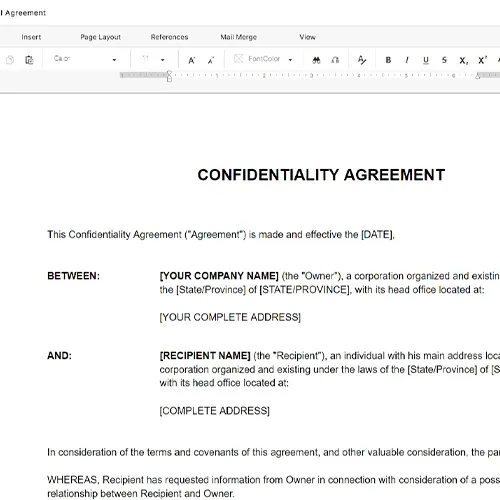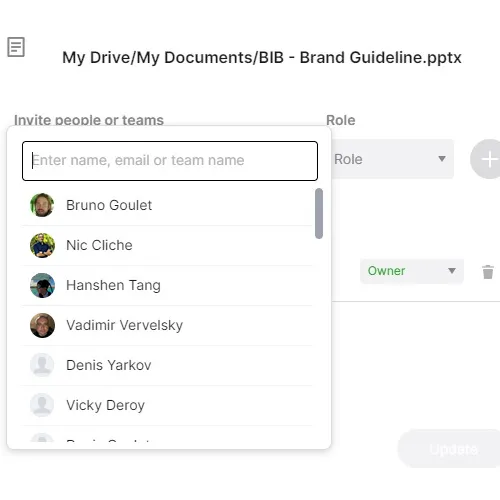Becoming An Entrepreneur Template

Document content
This becoming an entrepreneur template has 17 pages and is a MS Word file type listed under our business plan kit documents.
Sample of our becoming an entrepreneur template:
A Guide to Becoming an Entrepreneur Written by Bruno Goulet, Founder and CEO of Biztree Creator of Business-in-a-Box Table of Contents The Entrepreneur in You 3 Becoming an Entrepreneur 3 When is the Best Time to Start a Business? 4 Start While You are Young 4 No Longer Young? It's Not Too Late! 5 Don't Wait Until You Can Line Up All Your Ducks in a Row 5 Are You Ready to Start Up Your Business? 6 Do You Have What it Takes? 7 Top 100 Characteristics of Successful Entrepreneurs 7 What Type of Entrepreneur are You? 12 The Social Entrepreneur 12 The Lifestyle Entrepreneur 13 The Artist 13 The Serial Entrepreneur 14 The Wealth Creator 15 The Investor Entrepreneur 15 So, What Type of Entrepreneur Do You Think You are? 16 The Entrepreneur in You "Entrepreneurship is living a few years of your life like most people won't, so you can spend the rest of your life like most people can't." - Unknown Becoming an Entrepreneur An entrepreneur is a person who is willing to launch a new venture or enterprise and accept full responsibility for the outcome. Jean-Baptiste Say, a French economist, is believed to have coined the word "entrepreneur" in the 19th century. He defined an entrepreneur as "one who undertakes an enterprise, especially a contractor, acting as an intermediary between capital and labor." The entrepreneur leads an organization. Management skills and strong team building abilities are essential leadership attributes for successful entrepreneurs. Entrepreneurs become leaders because they can spot business opportunities and are well-positioned to take advantage of them. Often entrepreneurs are among the very few who can recognize or are able to solve a problem. They are innovators who love to create new processes, projects, products, or companies. Most entrepreneurs are not business professionals or MBA graduates. In fact, many of the richest people in the world have dropped out of school to start a business. This group includes the likes of Henry Ford (Ford), Bill Gates (Microsoft), Larry Ellison (Oracle), Michael Dell (Dell), Steve Jobs (Apple), Richard Branson (Virgin), Ralph Lauren (Ralph Lauren) and Mark Zuckerberg (Meta). It is common to find a dropout behind the success of several of the most admired enterprises. I am not encouraging anyone to quit school to start a business; I am just pointing out a fact. I am a dropout myself. I quit university with only three courses left to complete in my bachelor's degree to join a software startup back in 1999. I have always wanted to go back to finish my degree. I would also like to complete a master's degree one day, but the reality is that I always have way too many opportunities and business ideas to find the time to go back to school. And frankly, entrepreneurship provides a special kind of thrill that is not on a par with academic achievements, as far as I am concerned. I believe many entrepreneurs identify with this. Entrepreneurs are highly passionate people who have a great deal of talent, knowledge and expertise in their trade. Most business founders are technically experts at something. They are leaders who master a profession, art, or science. Entrepreneurs are not always born entrepreneurs, contrary to what most people believe. Many people from all age groups end up starting their own business as a consequence of losing their job or through the influence of other people in their life. When is the Best Time to Start a Business? Sooner is always better than later. And if you see opportunities right now that you feel you ought to exploit, now is the time. You need to feel ready to take on the challenge. If you spot opportunities, and feel the urge to start, that is a good sign. Start While You Are Young The younger you start, the better it would be, as long as you feel you are up to the challenge. Entrepreneurship is demanding. And you may need to change or give up a few things in your life. The younger and more flexible you are, the better and easier it would be. And of course, it is easier to live off peanut butter when you are young. When you are older, with family commitments, a reputation, and other trappings, you have more to lose if you fail. You would also seek more in terms of money and freedom from a business. But as you will see, many people have not let age become a barrier to entrepreneurship. No Longer Young? It's Not Too Late! This would mean you would feel very much at home among the majority of entrepreneurs. Meta's Mark Zuckerberg may be the poster boy for young entrepreneurs worldwide, but he is not the norm, age wise. Research by Global Entrepreneurship Monitor showed that people over 35 accounted for 80% of the total entrepreneurship activity. So, both time and age are on your side. The global recession and its fallout, in addition to global events like the COVID-19 pandemic, may also play a role in spurring on those who have always wanted to start their own business, who never really got down to it. A bad economy and worsening job prospects, combined with high unemployment levels, may be making entrepreneurship seem less risky too. People become more averse to risk as they age. But if you decide to become an entrepreneur, you have maturity, experience, wisdom, greater financial means and an already established network of contacts all on your side. Even then, older entrepreneurs have more to lose than younger ones, including well established credit and reputations. So, before you take the plunge, make sure you know what you are getting into. Don't Wait Until You Can Line Up All Your Ducks in a Row That may never happen. In business, timing is almost never 100% perfect. You will have to make a success out of imperfect information and market conditions. Also, waiting for everything to be perfect is not a quality of a successful entrepreneur; it is a sign of a dreamer who would never end up creating and operating a real business. Are You Ready to Start Up Your Business? If you are still with me at this point, and you believe that what I am saying is interesting, then you are most likely an entrepreneur or a wantrepreneur (someone dreaming about starting a business one day). If you still doubt whether you have what it takes to be successful in business, then the section below will help you gain the assurance that you can do it. It may also make you decide entrepreneurship is not for you, and forget the idea of having your own business. Either way, you will be making an informed decision, based on calculated risk. I am not here to sell you the desire to own a company. The initiative and the fire must come from you. It's something you must feel burning inside you. No one can make you an entrepreneur if you are not one at heart. Follow your gut feeling. As the founder of your own business, YOU, the entrepreneur, will be the single most important reason for success or failure of this new venture. YOU are the person that will make or break the business. Your strengths and weaknesses will most likely become the strengths and weaknesses of your business. Your limitations, whatever they are, will become limitations for your business as well. I know only one way to dramatically increase your chances for success: Become an expert at something you REALLY LOVE doing. Business success does not come easily. It will require you to take risks, to work hard and to never give up. Without a true passion for what you do, the desire to control your life, to learn, to lead and to make more money, you will never succeed; and that is guaranteed. In today's business environment, competitors and customers are way too challenging for half-hearted me-too businesses to survive or thrive. I invite you to stay with me until the end of this brief guide. You will discover a lot about yourself, and the common characteristics shared by top entrepreneurs
3,000+ Templates & Tools to Help You Start, Run & Grow Your Business

Document content
This becoming an entrepreneur template has 17 pages and is a MS Word file type listed under our business plan kit documents.
Sample of our becoming an entrepreneur template:
A Guide to Becoming an Entrepreneur Written by Bruno Goulet, Founder and CEO of Biztree Creator of Business-in-a-Box Table of Contents The Entrepreneur in You 3 Becoming an Entrepreneur 3 When is the Best Time to Start a Business? 4 Start While You are Young 4 No Longer Young? It's Not Too Late! 5 Don't Wait Until You Can Line Up All Your Ducks in a Row 5 Are You Ready to Start Up Your Business? 6 Do You Have What it Takes? 7 Top 100 Characteristics of Successful Entrepreneurs 7 What Type of Entrepreneur are You? 12 The Social Entrepreneur 12 The Lifestyle Entrepreneur 13 The Artist 13 The Serial Entrepreneur 14 The Wealth Creator 15 The Investor Entrepreneur 15 So, What Type of Entrepreneur Do You Think You are? 16 The Entrepreneur in You "Entrepreneurship is living a few years of your life like most people won't, so you can spend the rest of your life like most people can't." - Unknown Becoming an Entrepreneur An entrepreneur is a person who is willing to launch a new venture or enterprise and accept full responsibility for the outcome. Jean-Baptiste Say, a French economist, is believed to have coined the word "entrepreneur" in the 19th century. He defined an entrepreneur as "one who undertakes an enterprise, especially a contractor, acting as an intermediary between capital and labor." The entrepreneur leads an organization. Management skills and strong team building abilities are essential leadership attributes for successful entrepreneurs. Entrepreneurs become leaders because they can spot business opportunities and are well-positioned to take advantage of them. Often entrepreneurs are among the very few who can recognize or are able to solve a problem. They are innovators who love to create new processes, projects, products, or companies. Most entrepreneurs are not business professionals or MBA graduates. In fact, many of the richest people in the world have dropped out of school to start a business. This group includes the likes of Henry Ford (Ford), Bill Gates (Microsoft), Larry Ellison (Oracle), Michael Dell (Dell), Steve Jobs (Apple), Richard Branson (Virgin), Ralph Lauren (Ralph Lauren) and Mark Zuckerberg (Meta). It is common to find a dropout behind the success of several of the most admired enterprises. I am not encouraging anyone to quit school to start a business; I am just pointing out a fact. I am a dropout myself. I quit university with only three courses left to complete in my bachelor's degree to join a software startup back in 1999. I have always wanted to go back to finish my degree. I would also like to complete a master's degree one day, but the reality is that I always have way too many opportunities and business ideas to find the time to go back to school. And frankly, entrepreneurship provides a special kind of thrill that is not on a par with academic achievements, as far as I am concerned. I believe many entrepreneurs identify with this. Entrepreneurs are highly passionate people who have a great deal of talent, knowledge and expertise in their trade. Most business founders are technically experts at something. They are leaders who master a profession, art, or science. Entrepreneurs are not always born entrepreneurs, contrary to what most people believe. Many people from all age groups end up starting their own business as a consequence of losing their job or through the influence of other people in their life. When is the Best Time to Start a Business? Sooner is always better than later. And if you see opportunities right now that you feel you ought to exploit, now is the time. You need to feel ready to take on the challenge. If you spot opportunities, and feel the urge to start, that is a good sign. Start While You Are Young The younger you start, the better it would be, as long as you feel you are up to the challenge. Entrepreneurship is demanding. And you may need to change or give up a few things in your life. The younger and more flexible you are, the better and easier it would be. And of course, it is easier to live off peanut butter when you are young. When you are older, with family commitments, a reputation, and other trappings, you have more to lose if you fail. You would also seek more in terms of money and freedom from a business. But as you will see, many people have not let age become a barrier to entrepreneurship. No Longer Young? It's Not Too Late! This would mean you would feel very much at home among the majority of entrepreneurs. Meta's Mark Zuckerberg may be the poster boy for young entrepreneurs worldwide, but he is not the norm, age wise. Research by Global Entrepreneurship Monitor showed that people over 35 accounted for 80% of the total entrepreneurship activity. So, both time and age are on your side. The global recession and its fallout, in addition to global events like the COVID-19 pandemic, may also play a role in spurring on those who have always wanted to start their own business, who never really got down to it. A bad economy and worsening job prospects, combined with high unemployment levels, may be making entrepreneurship seem less risky too. People become more averse to risk as they age. But if you decide to become an entrepreneur, you have maturity, experience, wisdom, greater financial means and an already established network of contacts all on your side. Even then, older entrepreneurs have more to lose than younger ones, including well established credit and reputations. So, before you take the plunge, make sure you know what you are getting into. Don't Wait Until You Can Line Up All Your Ducks in a Row That may never happen. In business, timing is almost never 100% perfect. You will have to make a success out of imperfect information and market conditions. Also, waiting for everything to be perfect is not a quality of a successful entrepreneur; it is a sign of a dreamer who would never end up creating and operating a real business. Are You Ready to Start Up Your Business? If you are still with me at this point, and you believe that what I am saying is interesting, then you are most likely an entrepreneur or a wantrepreneur (someone dreaming about starting a business one day). If you still doubt whether you have what it takes to be successful in business, then the section below will help you gain the assurance that you can do it. It may also make you decide entrepreneurship is not for you, and forget the idea of having your own business. Either way, you will be making an informed decision, based on calculated risk. I am not here to sell you the desire to own a company. The initiative and the fire must come from you. It's something you must feel burning inside you. No one can make you an entrepreneur if you are not one at heart. Follow your gut feeling. As the founder of your own business, YOU, the entrepreneur, will be the single most important reason for success or failure of this new venture. YOU are the person that will make or break the business. Your strengths and weaknesses will most likely become the strengths and weaknesses of your business. Your limitations, whatever they are, will become limitations for your business as well. I know only one way to dramatically increase your chances for success: Become an expert at something you REALLY LOVE doing. Business success does not come easily. It will require you to take risks, to work hard and to never give up. Without a true passion for what you do, the desire to control your life, to learn, to lead and to make more money, you will never succeed; and that is guaranteed. In today's business environment, competitors and customers are way too challenging for half-hearted me-too businesses to survive or thrive. I invite you to stay with me until the end of this brief guide. You will discover a lot about yourself, and the common characteristics shared by top entrepreneurs
Easily Create Any Business Document You Need in Minutes.

Access over 3,000+ business and legal templates for any business task, project or initiative.

Customize your ready-made business document template and save it in the cloud.

Share your files and folders with your team. Create a space of seamless collaboration.
Templates and Tools to Manage Every Aspect of Your Business.
Business in a Box Covers Every Business Department
Includes 16 Types of Business Documents You Need
and Achieve Your Business Goals Faster.
